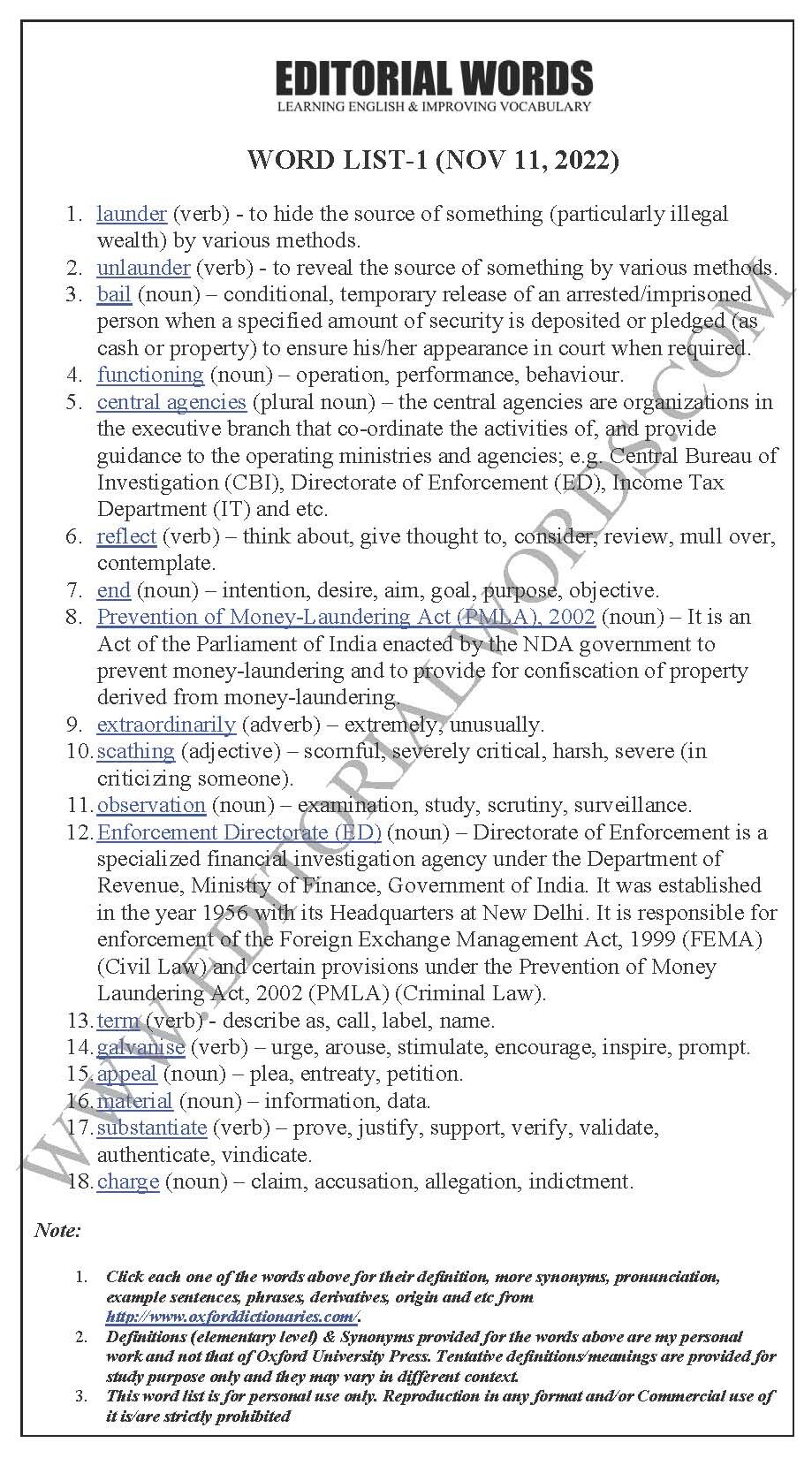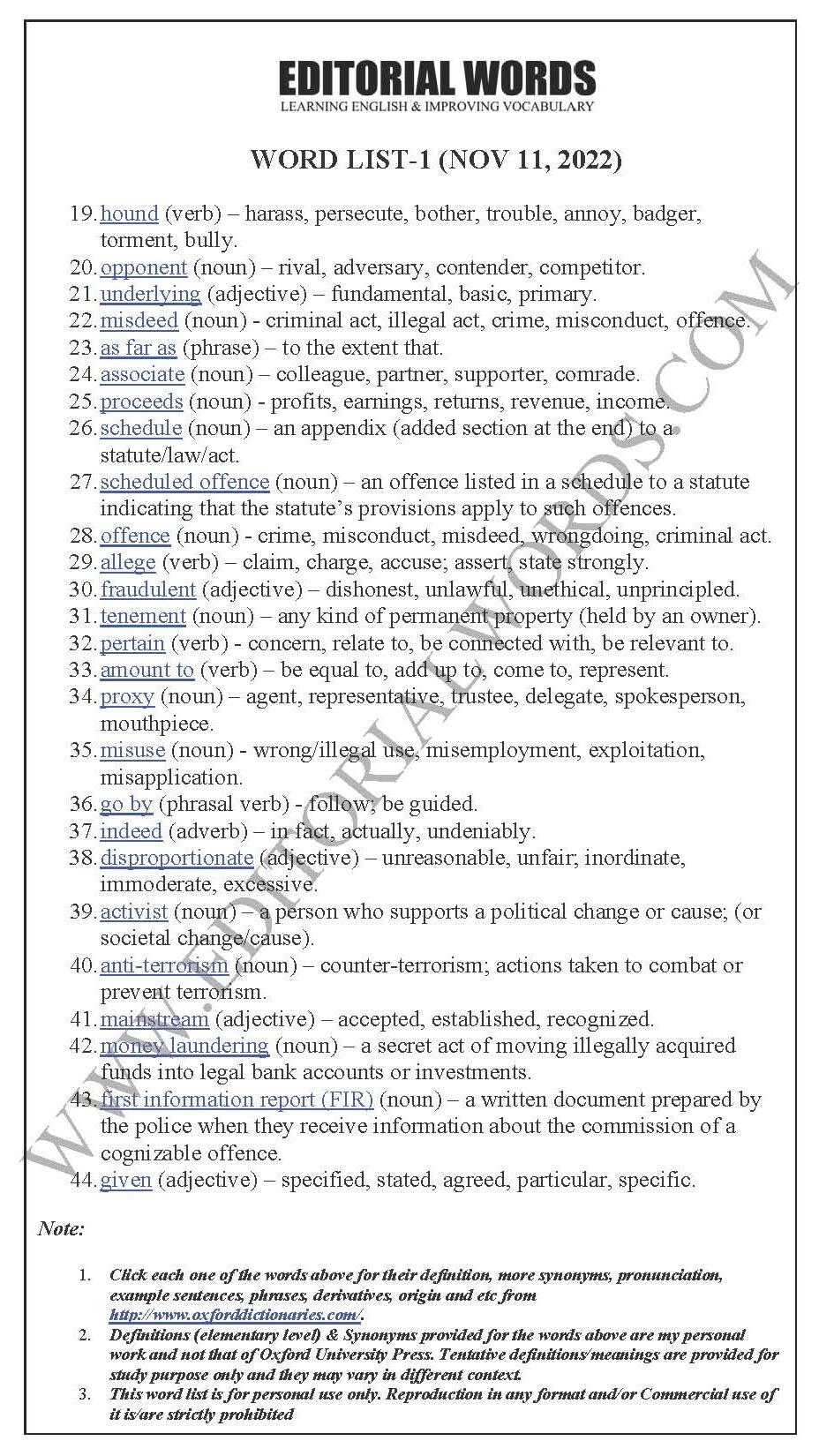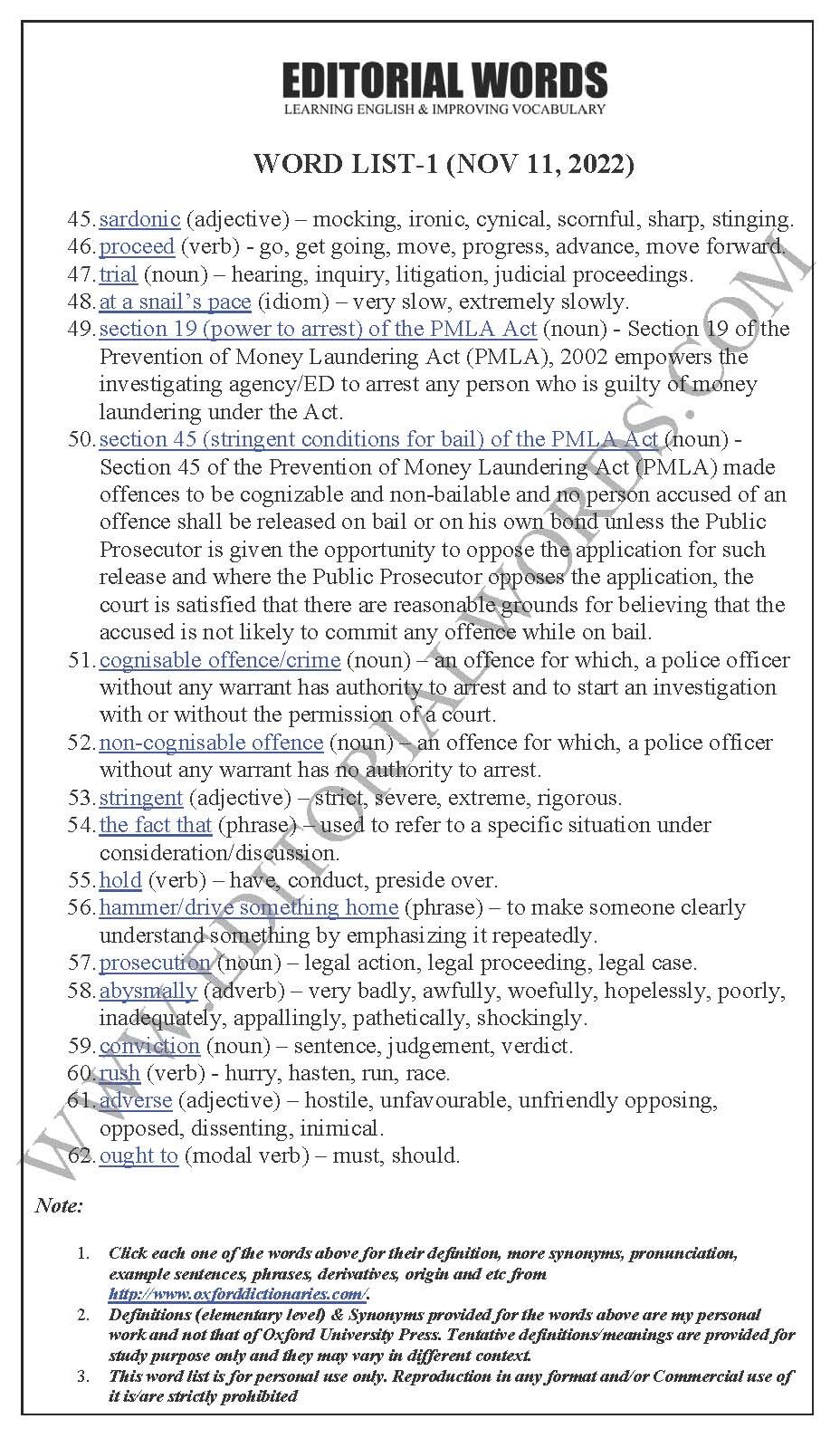The Hindu Editorial (Unlaundered truth) – Nov 11, 2022
A Special Court dealing with cases under the Prevention of Money Laundering Act (PMLA) in Mumbai has made some extraordinarily scathing observations about the way the Enforcement Directorate (ED) functions. For further reading, visit “The Hindu”. Below is today’s word list-1 for The Hindu Editorial (Unlaundered truth) – Nov 11, 2022.
To read this article, click “The Hindu”.
This preview is provided here with permission
Courtesy: The Hindu
The Hindu Editorial (Unlaundered truth) – Nov 11, 2022:
- launder (verb) – to hide the source of something (particularly illegal wealth) by various methods.
- unlaunder (verb) – to reveal the source of something by various methods.
- bail (noun) – conditional, temporary release of an arrested/imprisoned person when a specified amount of security is deposited or pledged (as cash or property) to ensure his/her appearance in court when required.
- functioning (noun) – operation, performance, behaviour.
- central agencies (plural noun) – the central agencies are organizations in the executive branch that co-ordinate the activities of, and provide guidance to the operating ministries and agencies; e.g. Central Bureau of Investigation (CBI), Directorate of Enforcement (ED), Income Tax Department (IT) and etc.
- reflect (verb) – think about, give thought to, consider, review, mull over, contemplate.
- end (noun) – intention, desire, aim, goal, purpose, objective.
- Prevention of Money-Laundering Act (PMLA), 2002 (noun) – It is an Act of the Parliament of India enacted by the NDA government to prevent money-laundering and to provide for confiscation of property derived from money-laundering.
- extraordinarily (adverb) – extremely, unusually.
- scathing (adjective) – scornful, severely critical, harsh, severe (in criticizing someone).
- observation (noun) – examination, study, scrutiny, surveillance.
- Enforcement Directorate (ED) (noun) – Directorate of Enforcement is a specialized financial investigation agency under the Department of Revenue, Ministry of Finance, Government of India. It was established in the year 1956 with its Headquarters at New Delhi. It is responsible for enforcement of the Foreign Exchange Management Act, 1999 (FEMA) (Civil Law) and certain provisions under the Prevention of Money Laundering Act, 2002 (PMLA) (Criminal Law).
- term (verb) – describe as, call, label, name.
- galvanise (verb) – urge, arouse, stimulate, encourage, inspire, prompt.
- appeal (noun) – plea, entreaty, petition.
- material (noun) – information, data.
- substantiate (verb) – prove, justify, support, verify, validate, authenticate, vindicate.
- charge (noun) – claim, accusation, allegation, indictment.
- hound (verb) – harass, persecute, bother, trouble, annoy, badger, torment, bully.
- opponent (noun) – rival, adversary, contender, competitor.
- underlying (adjective) – fundamental, basic, primary.
- misdeed (noun) – criminal act, illegal act, crime, misconduct, offence.
- as far as (phrase) – to the extent that.
- associate (noun) – colleague, partner, supporter, comrade.
- proceeds (noun) – profits, earnings, returns, revenue, income.
- schedule (noun) – an appendix (added section at the end) to a statute/law/act.
- scheduled offence (noun) – an offence listed in a schedule to a statute indicating that the statute’s provisions apply to such offences.
- offence (noun) – crime, misconduct, misdeed, wrongdoing, criminal act.
- allege (verb) – claim, charge, accuse; assert, state strongly.
- fraudulent (adjective) – dishonest, unlawful, unethical, unprincipled.
- tenement (noun) – any kind of permanent property (held by an owner).
- pertain (verb) – concern, relate to, be connected with, be relevant to.
- amount to (verb) – be equal to, add up to, come to, represent.
- proxy (noun) – agent, representative, trustee, delegate, spokesperson, mouthpiece.
- misuse (noun) – wrong/illegal use, misemployment, exploitation, misapplication.
- go by (phrasal verb) – follow; be guided.
- indeed (adverb) – in fact, actually, undeniably.
- disproportionate (adjective) – unreasonable, unfair; inordinate, immoderate, excessive.
- activist (noun) – a person who supports a political change or cause; (or societal change/cause).
- anti-terrorism (noun) – counter-terrorism; actions taken to combat or prevent terrorism.
- mainstream (adjective) – accepted, established, recognized.
- money laundering (noun) – a secret act of moving illegally acquired funds into legal bank accounts or investments.
- first information report (FIR) (noun) – a written document prepared by the police when they receive information about the commission of a cognizable offence.
- given (adjective) – specified, stated, agreed, particular, specific.
- sardonic (adjective) – mocking, ironic, cynical, scornful, sharp, stinging.
- proceed (verb) – go, get going, move, progress, advance, move forward.
- trial (noun) – hearing, inquiry, litigation, judicial proceedings.
- at a snail’s pace (idiom) – very slow, extremely slowly.
- section 19 (power to arrest) of the PMLA Act (noun) – Section 19 of the Prevention of Money Laundering Act (PMLA), 2002 empowers the investigating agency/ED to arrest any person who is guilty of money laundering under the Act.
- section 45 (stringent conditions for bail) of the PMLA Act (noun) – Section 45 of the Prevention of Money Laundering Act (PMLA) made offences to be cognizable and non-bailable and no person accused of an offence shall be released on bail or on his own bond unless the Public Prosecutor is given the opportunity to oppose the application for such release and where the Public Prosecutor opposes the application, the court is satisfied that there are reasonable grounds for believing that the accused is not likely to commit any offence while on bail.
- cognisable offence/crime (noun) – an offence for which, a police officer without any warrant has authority to arrest and to start an investigation with or without the permission of a court.
- non-cognisable offence (noun) – an offence for which, a police officer without any warrant has no authority to arrest.
- stringent (adjective) – strict, severe, extreme, rigorous.
- the fact that (phrase) – used to refer to a specific situation under consideration/discussion.
- hold (verb) – have, conduct, preside over.
- hammer/drive something home (phrase) – to make someone clearly understand something by emphasizing it repeatedly.
- prosecution (noun) – legal action, legal proceeding, legal case.
- abysmally (adverb) – very badly, awfully, woefully, hopelessly, poorly, inadequately, appallingly, pathetically, shockingly.
- conviction (noun) – sentence, judgement, verdict.
- rush (verb) – hurry, hasten, run, race.
- adverse (adjective) – hostile, unfavourable, unfriendly opposing, opposed, dissenting, inimical.
- ought to (modal verb) – must, should.
Note:
1. Click each one of the words above for their definition, more synonyms, pronunciation, example sentences, phrases, derivatives, origin and etc from http://www.oxforddictionaries.com/.
2. Definitions (elementary level) & Synonyms provided for the words above are my personal work and not that of Oxford University Press. Tentative definitions/meanings are provided for study purpose only and they may vary in a different context.
3. This word list is for personal use only. Reproduction in any format and/or Commercial use of it is/are strictly prohibited.
The Hindu Editorial (Unlaundered truth) – Nov 11, 2022:



“Phrasal Verbs” We Learnt Last Week
“Idioms & Phrases” We Learnt Last Week
“Important Definitions” We Learnt Last Week
Recent Word Lists For The Hindu Editorial Articles

Be the first to comment